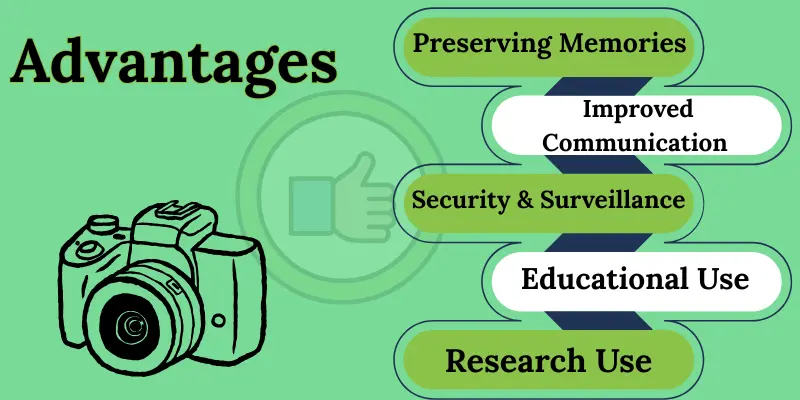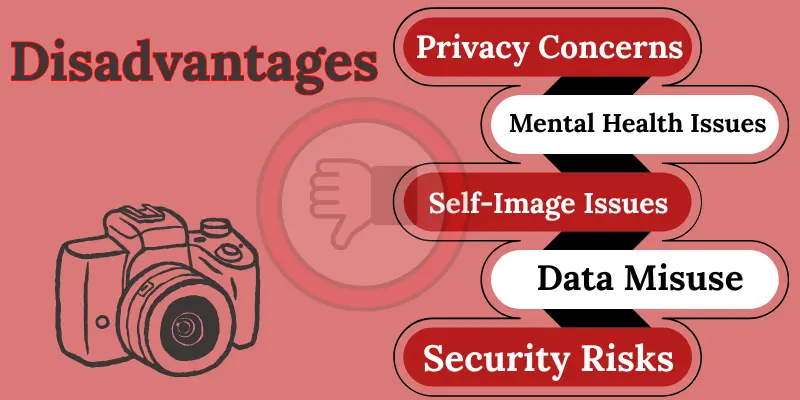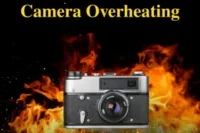Discover the Benefits and Drawbacks of Cameras in Daily Life & More
Published: 25 Apr 2025
Cameras have become an essential part of modern life, from smartphones in our pockets to security systems in public places. They help us record memories, express ourselves creatively, and stay connected. But just like any technology, cameras come with their own set of pros and cons.
In this article, I’ll explain the most important advantages and disadvantages of camera, share helpful tips, and answer common questions so you can use your camera more effectively and responsibly. So, let’s get started
Advantages of Cameras
Below are some of the most impactful benefits of using cameras in daily life, education, security, and professional fields.

1. Preserving Memories
Cameras help us capture life’s most meaningful moments, like birthdays, vacations, celebrations, and the small, everyday moments that are easy to forget. These visual memories act as time capsules, reminding us of the people, places, and feelings that shape our personal stories. Whether printed in albums or stored digitally, they allow us to look back and relive experiences with clarity and emotion.
2. Creative and Professional Opportunities
Cameras do more than take pictures — they’re powerful tools for creativity and professional growth. Whether you’re capturing content for social media, filming, or teaching, cameras help professionals tell stories, promote ideas, and connect with audiences across different fields.
3. Enhanced Communication
Cameras have transformed the way we connect and share ideas. Whether it’s a video call with family, a vlog on YouTube, or an online class, cameras make communication more personal and expressive. Visual content helps convey tone, emotion, and detail far better than text alone.
4. Security and Surveillance
Cameras are an essential part of modern safety systems. Whether used in homes or public places, they help prevent crime, provide evidence when something goes wrong, and support quicker response from authorities. Just the presence of a camera can often make people think twice before acting unlawfully.
5. Educational and Research Use
Cameras make learning and research more effective. Teachers record lectures, scientists document experiments, and students use visuals to better understand complex topics. Whether in classrooms or labs, cameras help turn information into something we can see, study, and remember more easily.
Disadvantages of Cameras
Cameras offer many benefits, but they also have some major drawbacks. From privacy concerns to social media pressures, let’s explore how they affect our lives.

1. Privacy Concerns
Cameras can help keep us safe, but they can also be irritating. Hidden recording, public surveillance, or filming without permission can cross personal boundaries. Without clear rules, cameras may lead to a loss of privacy, both in public places and private spaces.
2. Mental Health and Self-Image Issues
Cameras, especially on social media, often create unrealistic beauty standards. Filters, photo edits, and the constant pressure to look perfect can impact self-image, leading to anxiety, low self-esteem, and other mental health issues.
3. High Costs
Professional camera equipment isn’t inexpensive. From buying cameras and lenses to lighting, tripods, and editing software, the expenses add up quickly. Even maintaining and upgrading equipment over time can be a financial challenge for many users.
4. Data Misuse and Security Risks
Digital photos and videos need to be protected. If not stored securely, they can be hacked, leaked, or shared without permission. Whether it’s personal photos or sensitive content, poor security can put your data and your reputation at risk.
5. Ethical and Legal Challenges
Not everyone wants to be recorded, especially in private or sensitive situations. Filming without permission is not only disrespectful but also illegal in many places. Cameras should always be used responsibly, with respect for privacy and awareness of local regulations.
More Actionable Tips for Camera Users
To get the most out of your camera, it’s important to follow some simple yet effective tips that will not only improve your photography skills but also ensure that you’re using your camera responsibly and respectfully.
- Respect privacy: Always ask for permission before photographing or recording others, especially in private or sensitive situations.
- Keep your equipment clean and secure: Regularly clean your lens and store your equipment safely to prevent damage.
- Back up your media: Use cloud services or external drives to keep your photos and videos safe from data loss.
- Understand your settings: Learn the basics, like exposure, focus, and lighting, to improve your shots.
- Be mindful of context: Think about the emotional and social impact before sharing a photo.
- Use cameras with purpose: Sometimes, it’s better to enjoy the moment than always to capture it.
Frequently Asked Questions (FAQs)
Here are answers to some of the most common questions about camera advantages and disadvantages:
Cameras help us capture important memories, communicate better through video calls, and express creativity in photos and videos. They also help improve safety by monitoring public and private spaces.
Privacy violations are a major concern when using cameras, especially if they are used without permission. Cameras can also lead to mental health issues, especially with unrealistic beauty standards on social media. Additionally, high-end camera equipment can be expensive, and content can be misused if not properly secured.
Smartphone cameras are great for casual use and quick photos. However, for more advanced work like professional photography or filmmaking, higher-quality cameras with specialized lenses and features are needed to achieve better results.
Recording in public spaces is generally allowed in many countries, but it’s important to be mindful of people’s privacy. Laws vary by location, and shooting in private or sensitive areas may require consent or special permission.
Start by learning the basic settings of your camera, such as focus, exposure, and lighting. Practice regularly to improve your technique, and watching videos will teach you new tricks and tips. Don’t hesitate to ask for feedback to help improve your skills.
Photography allows us to capture moments, preserve memories, and express our creativity. However, it can be costly, time-consuming, and sometimes violate privacy. Additionally, sharing photos on social media may create unrealistic expectations.
Body cameras can raise privacy concerns for both the person being recorded and the wearer. They also pose security risks, as footage could be hacked or misused. Additionally, body cameras can be costly and require ongoing maintenance.
Surveillance cameras reduce crime and provide valuable evidence in investigations. However, they can violate privacy and create a false sense of security. There’s also the risk of misuse, as footage could be accessed illegally or hacked.
DSLR cameras offer high-quality images with great detail and versatility. They allow for interchangeable lenses, giving users creative flexibility.
Conclusion
Cameras offer great benefits, such as preserving memories and enhancing creativity, but they also raise privacy concerns and have mental health impacts. It’s essential to use them responsibly, respecting privacy and social boundaries. Cameras are powerful tools, but their impact depends on how we choose to use them.
Do you think cameras are more helpful or harmful in today’s world? Share your thoughts in the comments and check out our related article on Types of Cameras to learn more about different camera technologies and their uses.

- Be Respectful
- Stay Relevant
- Stay Positive
- True Feedback
- Encourage Discussion
- Avoid Spamming
- No Fake News
- Don't Copy-Paste
- No Personal Attacks

- Be Respectful
- Stay Relevant
- Stay Positive
- True Feedback
- Encourage Discussion
- Avoid Spamming
- No Fake News
- Don't Copy-Paste
- No Personal Attacks





